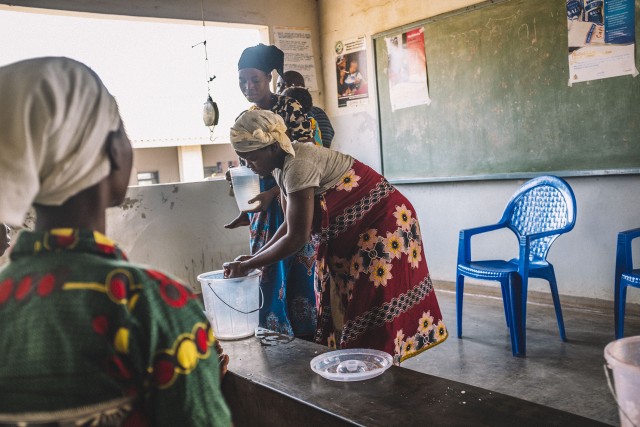Soap and water are needed. So is behaviour change.

Project InPATH in Malawi - Credit Raisa Mirza
Two billion people around the world rely on health care facilities that do not have any safe water, soap, or toilets.1 This puts not only people, but entire communities at risk. As we have seen recently and continue to observe, global health is our own health. Handwashing with soap has been proven to be one of the best preventative life-saving measures available. However, two in five health care facilities in the world do not have any water, soap, or alcohol-based hand sanitizer at points of care.2 These health care facilities are the frontlines of global health.
Even when a facility does have access to supplies and infrastructure and staff is aware of proper hand hygiene behaviours, some 61% of health workers still do not practise them.3 In addition to ensuring access to safe water, sanitation, and hygiene (WASH) services, we need to promote systemic and long-term behaviour change, in order to change the current statistics where 1 in 6 patients worldwide acquire an infection inside a health care facility.4
At One Drop, we focus on long-term behaviour change. Through our Social Art for Behaviour ChangeTM (SABC) approach, we work with health care workers, cleaners, government officials, and key community members using a participatory and creative process. Our approach inspires, activates, and sustains key sanitation and hygiene behaviours such as handwashing with soap. Through the arts, we are able to trigger more of an emotional response, and that carries more weight in influencing people’s decision-making and promoting a behavioural shift.
And this approach has shown results. In Mali, community-based theatre performances about handwashing with soap were videotaped and projected in waiting rooms in health care facilities, resulting in an approximate 20% increase in handwashing among patients, only 2 months after the start of our intervention. In Malawi, birth attendants from 3 districts co-created a fun, upbeat song with a well-known artist, SKEFFA, to serve as a handwashing reminder. SABC is based on feelings, emotions and local realities.
In 2018, we committed to a global call to action by the United-Nations Secretary-General. With our unique approach, we joined other funders, international nonprofit organizations, and governments to make water, sanitation, and hygiene in health care facilities a priority.
The economics for investing in water, sanitation, and hygiene in health care facilities is compelling. For every dollar investment, an estimated $5 of economic value is created. But for One Drop, it is clear that an investment in infrastructure alone is not enough. To ensure the sustainability of water projects and for better global health, addressing behaviour change must be a nonnegotiable priority. It results in healthier and more productive populations, less maternal and child mortality, more time and money to invest in education, fewer infections, and less use of antibiotics.
In January, World Health Organization (WHO) Director-General Tedros Adhanom Ghebreyesus cited the absence of water, toilets, soap, and waste management in health care facilities among the most urgent global challenges this decade. As we have seen this week, global health has a direct impact on economies and more importantly, the well-being of people. As we are going through this global health crisis, we need to protect populations all over the world and make sure that the aftermath brings about positive change.
Together, let’s ensure that health care facilities all around the world become centres of healing, not centres of infection. We are all in this together. Let’s take action together.
1. WASH in health care facilities: Global Baseline Report 2019
2. WASH in health care facilities: Global Baseline Report 2019
3. Health care without avoidable infections. The critical role of infection prevention and control
4. Burden of endemic health-care-associated infection in developing countries: systematic review and meta-analysis
